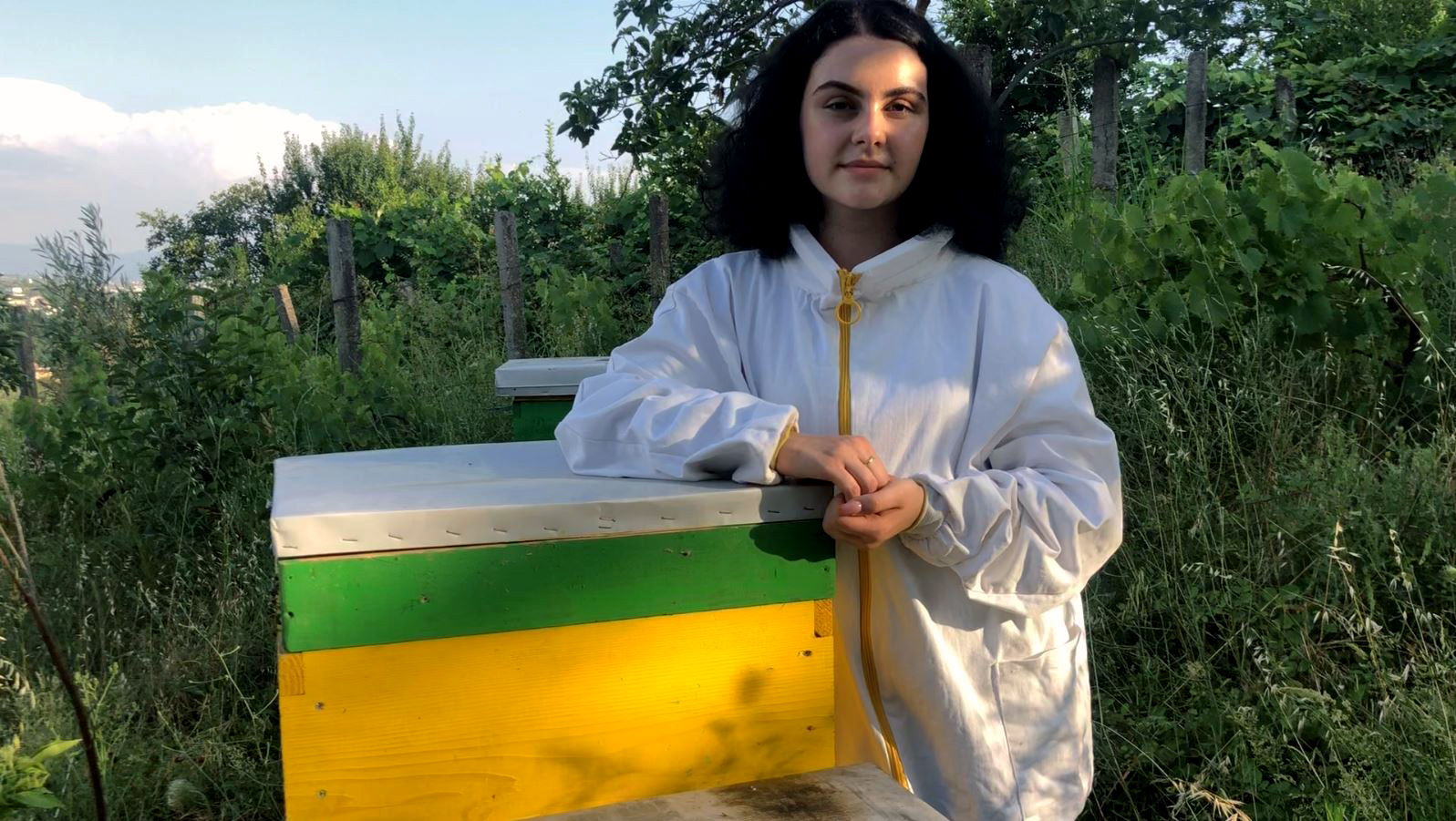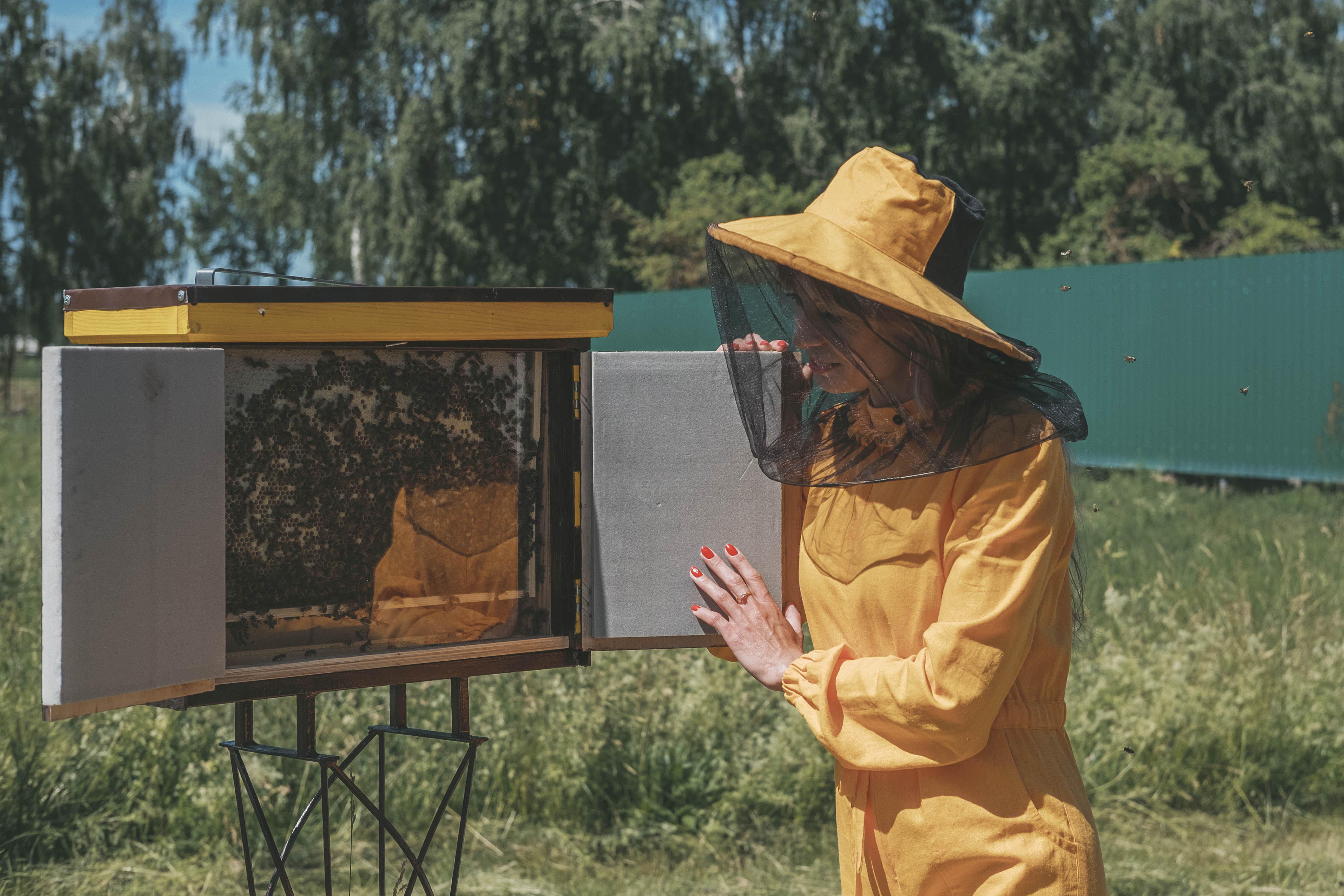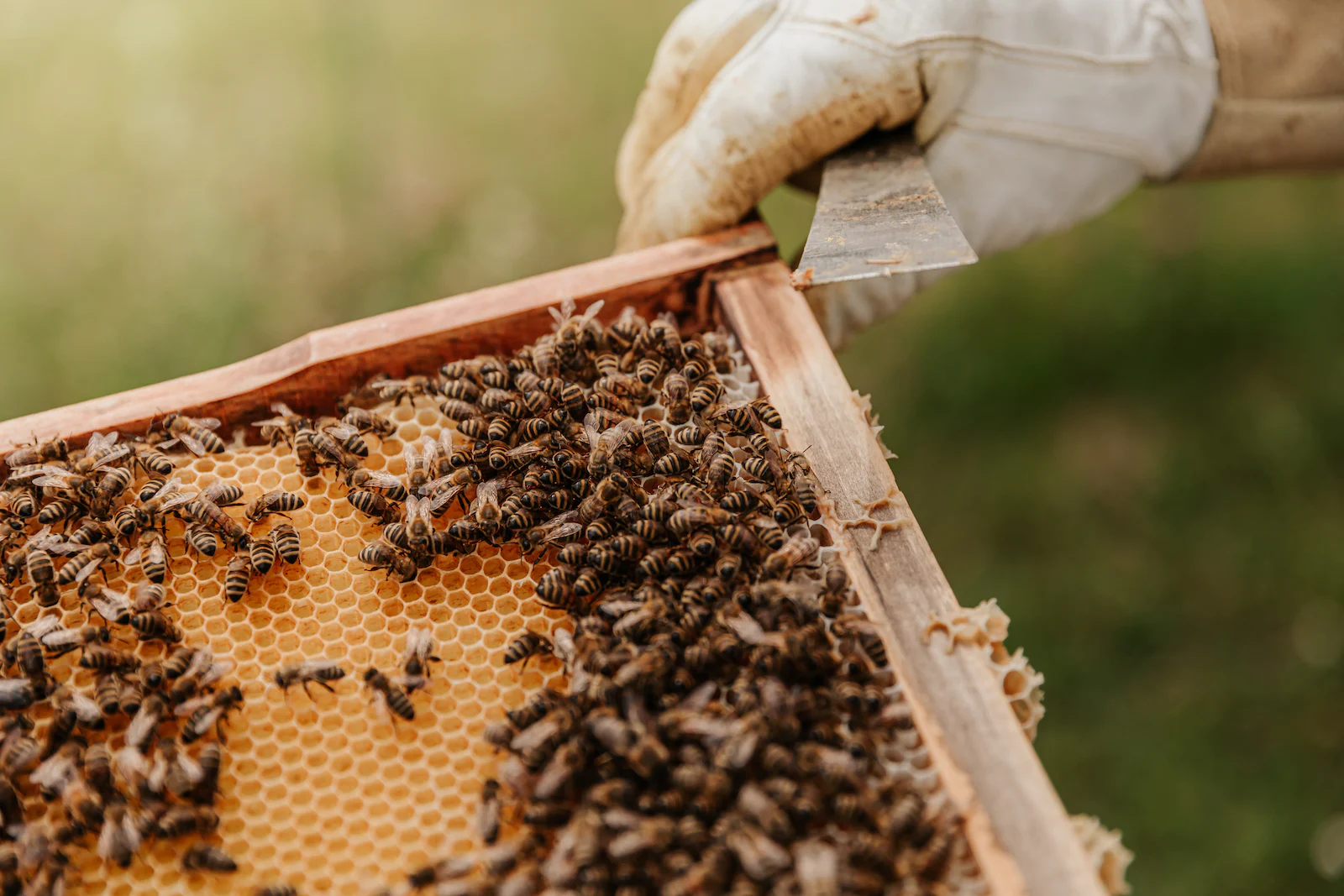Contents
- I. Introduction to Beekeeping and Ecological Balance
- II. Importance of Bees in Maintaining Ecological Balance
- III. The Role of Beekeeping in Promoting Ecological Balance
- IV. Benefits of Beekeeping for the Environment
- V. Beekeeping Practices that Support Ecological Balance
- VI. Challenges Faced in Beekeeping and Ecological Balance
- VII. Frequently Asked Questions about Beekeeping and Ecological Balance
- 1. Why is ecological balance important?
- 2. How does beekeeping contribute to ecological balance?
- 3. What are the benefits of bee pollination?
- 4. Can beekeeping harm the environment?
- 5. How can I start my own beehive without harming the ecosystem?
- 6. Are there any regulations or permits required for keeping bees?
- 7. How can I attract bees to my garden?
- 8. Can urban areas support beekeeping?
- 9. What are some challenges faced by urban beekeepers?
- 10. How can individuals contribute to ecological balance apart from beekeeping?
I. Introduction to Beekeeping and Ecological Balance

Welcome to the fascinating world of beekeeping! In this article, we will explore the intricate relationship between beekeeping and ecological balance. Bees, those small buzzing creatures, play a vital role in maintaining our environment’s harmony.
The Importance of Bees
Bees are not just honey producers; they are essential pollinators for various plants and crops. As they move from flower to flower in search of nectar, bees inadvertently transfer pollen grains, ensuring fertilization occurs. This process is crucial for both wild vegetation and agricultural production.
Without bees’ diligent pollination efforts, many plant species would struggle to reproduce effectively. This decline in plant diversity would lead to a cascade of negative effects on ecosystems as a whole.
Bee Decline and Ecological Imbalance
In recent years, there has been growing concern about the decline in bee populations worldwide. Factors such as habitat loss, pesticide use, climate change, and diseases have all contributed to this alarming trend.
The consequences of declining bee populations extend far beyond their own survival. When bees suffer setbacks or disappear from an area entirely, it disrupts the delicate ecological balance that sustains diverse plant life.
Promoting Ecological Balance through Beekeeping
Beekeeping offers a proactive solution towards promoting ecological balance by supporting healthy bee populations. By providing suitable habitats for bees and managing their colonies responsibly with sustainable practices like organic farming methods or reduced pesticide usage near beehives can make a significant impact.
Moreover, beekeepers can also contribute by planting diverse flowering plants that provide nectar throughout the year—this helps ensure continuous food sources for bees even during lean seasons when natural floral resources may be scarce.
Benefits of Beekeeping
Beyond the ecological advantages, beekeeping also offers numerous benefits for humans. Honey production is one obvious advantage, with honey being a versatile and delicious natural sweetener that can replace refined sugars in various culinary applications.
Additionally, beekeepers can harvest other valuable hive products like beeswax and propolis, which find use in cosmetics, candles, and even medicinal purposes due to their antimicrobial properties.
II. Importance of Bees in Maintaining Ecological Balance

Bees play a crucial role in maintaining ecological balance, making them an essential species for our planet’s survival. Their impact on the environment extends far beyond their ability to produce honey and beeswax. Let us explore some key reasons why bees are vital to sustaining our ecosystem.
Pollination: Ensuring Biodiversity and Food Production
One of the most significant contributions made by bees is their role as pollinators. As they move from flower to flower collecting nectar, they inadvertently transfer pollen grains between plants, aiding in their fertilization process. This process enables the production of fruits, vegetables, nuts, and seeds that form the foundation of our food chain.
In fact, it is estimated that approximately 80% of flowering plants depend on pollinators like bees for reproduction. Without these industrious insects spreading pollen, many plant species would struggle to reproduce and thrive.
Ecosystem Stability: Supporting Wildlife Habitats
Beyond agriculture, bees also contribute to maintaining diverse wildlife habitats by pollinating wildflowers and other plants essential for animals’ survival. The availability of varied plant life attracts insects, birds, and small mammals that rely on these resources for shelter and sustenance.
Additionally, certain bee species serve as critical pollinators for specific plant communities or ecosystems. For instance, bumblebees are known to be effective “buzz” pollinators capable of extracting pollen from flowers with poricidal anthers (those requiring vibratory movements). These unique abilities make them irreplaceable in sustaining ecosystems where such floral structures exist.
Economic Impact: Supporting Agriculture and Industries
The economic value derived from bee-dependent agricultural activities cannot be understated either. Bees contribute significantly to global crop yields, enhancing productivity and ensuring food security. Estimates suggest that their pollination services are worth billions of dollars worldwide.
Moreover, bees also support various industries through the production of honey, beeswax, propolis, royal jelly, and other valuable bee-derived products. These commodities have diverse applications in medicine, cosmetics, candles, and even musical instruments.
Indicator Species: Environmental Health Monitoring
The health and well-being of bee populations can serve as an indicator of overall environmental health. Since bees interact with multiple plant species across vast areas while foraging for nectar and pollen, any decline or shift in their populations may indicate disruptions in ecosystems due to factors like pollution or habitat loss.
By monitoring bee populations closely and implementing conservation measures when necessary, we can address potential imbalances within our environment before they escalate further.
III. The Role of Beekeeping in Promoting Ecological Balance

Beekeeping plays a crucial role in promoting ecological balance, benefiting both the environment and human society. Let’s explore the various ways in which beekeeping contributes to maintaining a healthy ecosystem.
Pollination and Biodiversity
One of the primary functions of bees is pollination, which is essential for the reproduction and diversity of plant species. Bees transfer pollen from male to female flower parts, enabling plants to produce fruits, seeds, and new generations. By actively participating in this process, bees help sustain biodiversity by ensuring the survival of numerous plant species.
Ecosystem Services
Beekeeping provides vital ecosystem services that go beyond just pollination. Honeybees are known as keystone species due to their significant impact on ecosystems. Through their foraging activities, bees aid in seed dispersal and facilitate nutrient recycling by breaking down organic matter into compost-like substances.
Conservation Efforts
Beekeeping also contributes to conservation efforts by providing habitats for bees themselves. As natural habitats continue to decline due to urbanization and agricultural expansion, managed beehives act as safe havens where bees can thrive amidst adverse conditions.
Sustainable Agriculture
The presence of bees on farmlands enhances agricultural productivity through increased crop yields via efficient pollination services. Many crops rely heavily on insect pollinators like honeybees for successful fruit set and production. Beekeepers often collaborate with farmers to strategically place hives near flowering crops, ensuring optimal pollination rates.
Promotion of Native Plants
By encouraging beekeepers’ practices that focus on native plant species cultivation, we can promote local flora growth while supporting indigenous insect populations. Native plants offer abundant nectar and pollen sources for bees, which in turn helps sustain bee colonies and their beneficial activities within the ecosystem.
IV. Benefits of Beekeeping for the Environment

Beekeeping, also known as apiculture, not only provides us with honey and beeswax but also plays a crucial role in maintaining ecological balance. Here are several benefits that beekeeping offers to the environment:
Pollination Enhancement
One of the most significant contributions of beekeeping is its positive impact on pollination. Bees are exceptional pollinators, facilitating the reproduction of flowering plants by transferring pollen from male to female flower parts. This process leads to fertilization and subsequent seed production. By keeping honeybees in apiaries near agricultural areas or gardens, farmers and gardeners can significantly increase crop yields through enhanced pollination.
Biodiversity Preservation
The presence of bees promotes biodiversity by aiding in cross-pollination among various plant species. As bees visit flowers in search of nectar and pollen, they inadvertently transfer pollen grains from one flower to another, thus facilitating genetic exchange between different plant populations. This interbreeding helps maintain genetic diversity within plant communities, ensuring their long-term survival.
Ecosystem Stability
Bees play a vital role in maintaining ecosystem stability by contributing to the overall health and resilience of natural habitats. Through their pollination services, they support the growth and survival of native plants that form the foundation of ecosystems. These plants provide food sources for other wildlife species while creating habitats that offer shelter and protection.
Sustainable Agriculture
Beekeeping practices align with sustainable agriculture principles by reducing reliance on chemical pesticides for crop protection. Since bees help improve crop yields through enhanced pollination, farmers can reduce or eliminate synthetic pesticides that harm beneficial insects like bees while negatively impacting human health and contaminating soil and water resources.
Carbon Sequestration
Beekeeping indirectly contributes to carbon sequestration, playing a small but significant role in mitigating climate change. By supporting the growth of flowering plants through pollination, bees aid in the absorption of carbon dioxide from the atmosphere. Furthermore, honeybees themselves help sequester carbon by collecting resinous plant materials for hive construction.
In conclusion, beekeeping offers numerous benefits to the environment. From enhancing pollination and preserving biodiversity to promoting ecosystem stability and sustainable agriculture, bees play an essential role in maintaining ecological balance. By supporting beekeeping practices and creating bee-friendly habitats, we can contribute to a healthier environment for all living beings.
V. Beekeeping Practices that Support Ecological Balance
Beekeeping is not just about producing honey; it is also an important practice that supports ecological balance. By implementing certain practices, beekeepers can contribute to the well-being of bees and the environment as a whole. Let’s explore some key methods that help maintain this delicate balance:
1. Providing Diverse Floral Resources
One crucial aspect of supporting ecological balance in beekeeping is ensuring a diverse range of floral resources for bees to forage on. Planting a variety of flowers, shrubs, and trees throughout the year can provide bees with ample sources of nectar and pollen, helping them thrive and contribute to pollination.
2. Avoiding Pesticide Use
Pesticides have been linked to declining bee populations worldwide. As responsible beekeepers, it is essential to avoid using harmful pesticides in or around beehives and surrounding areas. Instead, opt for organic pest control methods or integrated pest management techniques that minimize harm to both bees and other beneficial insects.
3. Promoting Natural Comb Building
In commercial beekeeping operations, pre-built plastic comb foundations are often used by convenience. However, encouraging bees to construct their own natural combs allows them greater freedom in shaping their living spaces according to their needs while fostering better hive health.
4. Implementing Integrated Pest Management (IPM)
To maintain healthy hives without resorting solely to chemical treatments against pests like Varroa mites or wax moths, integrated pest management (IPM) techniques can be employed effectively by closely monitoring hive conditions through regular inspections and taking timely preventive measures such as drone brood removal or creating strong colonies resistant against pests.
5. Practicing Sustainable Beekeeping
Adopting sustainable beekeeping practices contributes to ecological balance. This can involve using locally adapted bee strains that are better suited to the environment, reducing stress on bees during honey harvesting, and ensuring proper nutrition by leaving enough honey in the hive for overwintering.
6. Encouraging Native Bee Species
In addition to honeybees, native bee species are vital pollinators that play a significant role in maintaining ecological balance. As beekeepers, it is important to create habitats and nesting opportunities for native bees by incorporating native plants into the landscape and providing suitable nesting materials such as hollow stems or wood blocks.
7. Educating Others about Bees
Raising awareness about the importance of bees and their role in maintaining ecological balance is crucial. Share your knowledge with others through educational programs, workshops, or social media platforms, encouraging people to take action and support local bee populations.
By implementing these practices in our beekeeping endeavors, we can ensure that our actions not only benefit our own hives but also contribute positively to the broader ecosystem around us. Let’s strive for a harmonious relationship between humans and bees while protecting nature’s delicate equilibrium.
Remember: Bees are remarkable creatures that deserve our appreciation and care!
VI. Challenges Faced in Beekeeping and Ecological Balance
Beekeeping plays a crucial role in maintaining the ecological balance of our planet. However, it is not without its challenges. In this section, we will explore some of the obstacles faced by beekeepers and the impact they have on the delicate equilibrium of our environment.
Pesticide Use and Bee Health
One of the major challenges facing beekeepers today is the widespread use of pesticides. While these chemicals are designed to control pests, they can also have detrimental effects on bees. Pesticides contaminate nectar and pollen sources, leading to weakened immune systems among bees and increased susceptibility to diseases.
Habitat Loss
The loss of natural habitats poses another significant challenge for beekeepers. As urbanization expands and agricultural practices intensify, there is a decrease in wildflower meadows and diverse plant species that bees rely on for their survival. Without access to varied food sources throughout the year, bees struggle to find adequate nutrition, compromising their health and productivity.
Climate Change
The changing climate patterns affect both bees’ behavior and their available resources. Rising temperatures disrupt flower blooming times, causing a mismatch between pollinators’ emergence from hibernation and flowering plants’ peak season. This misalignment reduces pollination rates and threatens plant reproduction as well as food crop yields.
Pests and Diseases
Beekeeping operations face constant threats from pests such as varroa mites or diseases like American foulbrood. These invasive organisms can devastate entire colonies if left unchecked, leading to economic losses for beekeepers while also impacting local ecosystems that depend on pollination services provided by healthy honeybee populations.
Lack of Awareness
Another challenge lies in the lack of awareness and understanding of the importance of bees and their role in maintaining ecological balance. Many people fail to recognize the significance of these tiny creatures in pollinating crops and sustaining biodiversity. This ignorance hampers efforts to implement effective conservation strategies and can lead to further declines in bee populations.
VII. Frequently Asked Questions about Beekeeping and Ecological Balance
Here are some common questions that people often ask about beekeeping and its impact on ecological balance:
1. Why is ecological balance important?
Ecological balance refers to the delicate equilibrium between different organisms and their environment. It is crucial for the survival of all species, including humans, as it ensures the availability of resources such as clean air, water, and food.
2. How does beekeeping contribute to ecological balance?
Beekeeping plays a vital role in maintaining ecological balance by promoting pollination. Bees are excellent pollinators that help fertilize plants, leading to increased crop yields and biodiversity.
3. What are the benefits of bee pollination?
Bee pollination enhances agricultural productivity by stimulating fruiting and seed production in various crops. It also supports natural ecosystems by facilitating reproduction among flowering plants.
4. Can beekeeping harm the environment?
If practiced irresponsibly, beekeeping can have negative impacts on the environment. The excessive use of pesticides or improper hive management techniques can harm not only bees but also other beneficial insects and wildlife.
5. How can I start my own beehive without harming the ecosystem?
To ensure responsible beekeeping practices, it’s essential to choose organic methods for pest control instead of relying on harmful chemicals. Additionally, providing a diverse range of flowering plants in your surroundings will support local bees’ nutrition needs without causing disturbance to other species.
6. Are there any regulations or permits required for keeping bees?
The requirements for keeping bees vary depending on your location and local regulations. It’s advisable to check with the relevant authorities or beekeeping associations in your area to determine if you need any permits or licenses before starting your own beehive.
7. How can I attract bees to my garden?
To attract bees to your garden, plant a variety of native flowering plants that bloom throughout the year. Avoid using chemical pesticides and provide water sources like shallow dishes with pebbles for them to drink from.
8. Can urban areas support beekeeping?
Absolutely! Urban areas can provide suitable habitats for bees too. Rooftop gardens, community parks, and even small balconies can be transformed into bee-friendly spaces by planting nectar-rich flowers and creating nesting opportunities.
9. What are some challenges faced by urban beekeepers?
Urban beekeepers may encounter challenges such as limited forage availability due to concrete jungles, exposure to pollution, and potential conflicts with neighbors who may fear stings. However, proper planning and communication can help address these issues effectively.
10. How can individuals contribute to ecological balance apart from beekeeping?
Besides engaging in beekeeping practices, individuals can contribute to ecological balance by reducing their carbon footprint through sustainable lifestyle choices like conserving energy, minimizing waste generation, supporting organic farming methods, and preserving natural habitats.

Andrew Boyer is an accomplished individual with a deep-rooted passion for bees and their conservation. Born and raised in a small town in Oregon, Andrew developed an early fascination with nature and the environment. He pursued his education at the prestigious University of Oregon, where he obtained a Bachelor’s degree in Environmental Science with a specialization in Entomology. During his time at university, Andrew conducted extensive research on the behavior and ecological impact of bees, earning him recognition from his peers and professors. His dedication to the field led him to internships at local beekeeping associations, where he honed his skills in hive management and honey production. Andrew’s expertise in beekeeping and his commitment to environmental sustainability make him a valuable asset in the conservation of these vital pollinators.
